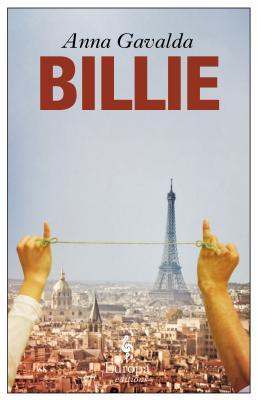 Anna Gavalda’s Billie is truly a wonderful story. Basically a story about two misfits who find one another, it is Gavalda’s voice which makes this the enjoyable read that it is.
Anna Gavalda’s Billie is truly a wonderful story. Basically a story about two misfits who find one another, it is Gavalda’s voice which makes this the enjoyable read that it is.
The novel begins with both Billie and Franck at the bottom of a gorge, after falling during a hiking trip in a French national park. Franck is seemingly hurt badly and slips into unconsciousness. Billie on the other hand has only minor injuries and as she worries about Franck’s condition as well as their predicament, she begins to tell the story of their lives (seemingly aloud) to a star in the night sky that she fixes on. It is this approach that makes the narrative so spectacular. Billie “riffs” on their story, her story, how they met and what led to the situation they find themselves in.
Billie (named after the Michael Jackson song Billie Jean by her parents) and her best friend Franck meet in middle school (interestingly, the Jacques Prevert Middle School). When she first notices him, she intuitively knows that she will be close to him, although at first, the two of them keep their distance. Franck keeps to himself, is quiet and bright, often menaced by those around him for his sexuality. The two become friends in French class and when the two of them are tasked to perform a scene from one of French writer Alfred de Musset’s short stories for the class, this is when their friendship truly begins to blossom.
The two are from very similar backgrounds: Billie’s parents are alcoholic and abusive; Franck’s father is perpetually unemployed and flirting with Christian extremism while his mother is zonked out on antidepressants most of the time. While Billie does everything in her power to get as far away from her family as possible (including moving in with a string of low class boyfriends), Franck is more afraid to declare his independence.
At some point the two are separated - with Franck going to a different school. Even with this distance, Franck keeps in touch, constantly sending her postcards, always letting Billie know that he was there thinking about her. While Franck is studying law (at the instance of his father) Billie is living a wild life - drinking, drugging, jumping from man to man (each one of them less than desirable), even going so far as to live in a trailer behind one of her boyfriend’s parents’ home, eating the family’s left overs (her boyfriend’s parents didn’t think she was “good enough” for their son and wouldn’t allow her in their house) so she would not have to deal with her own parents. Eventually Billie winds up with a real bastard of a man who one day tells her a story about how he and his friends took “that faggot” they knew from school and drove him out to the woods and abandoned him there covered in scent that attracts bears. Billie, knowing that he was referring to Franck, does something completely unexpected and this is the first clue that perhaps Billie isn’t exactly the “reliable narrator”. More on that in a bit.
So they are reunited and Billie insists that the two of them move in together in Paris and begin to live their lives. She convinces him to follow his own desires (to design jewelry) rather than study law just because he didn’t want to disappoint his father, further convincing him that his father would never except him for who he was, especially with his extreme Christian-xenophobic views. In an interesting switch to the third person, these young adult years to their middle years are revealed, bringing the story up to the present, where each of them become mildly successful at their chosen careers and more or less getting their lives in order - all the while being at one another’s side through it all. Then they decide to go on a hiking trip, along with others, and it is dealing with one family in particular - a crewcut wearing man with a wife and young son who manages to trigger all the horrible memories in Billie’s own life - where Billie once again shows her darker side; and this incident directly leads to the predicament they now find themselves in at the bottom of the gorge.
It is Billie’s “riffing” as she tells the story - often going off on tangents, joking, stream of consciousness digressions, most of which seem to be a cover for her highly sensitive and emotional states at times - which can give the reader a sense that perhaps Billie, although telling the story, isn’t quite the reliable narrator. It mostly focuses on herself, her feelings, her observations, and even though she does tell Franck’s story, it seems more from a distance, which is strange considering how close these two actually are. Franck’s dialogue comes in spurts, giving clues to his personality but Billie’s is up front and center, in your face. You know who she is, whether or not there is some ducking and weaving going on as to her deepest feelings, which a lot of the time she goes through great pains to conceal.
The situation they are in is resolved by the end of the novel but I won’t reveal what happens. Let’s just say that it makes sense in a lot of ways and it is a testament of love, friendship, companionship, and the strong bond that two people can have after knowing one another for a life time. The novel is a celebration of that bond and throughout the narrative you feel it, experience it, and can’t help but be moved by it. If anyone has someone that close to them in their life (which I do, which is probably why this novel spoke to me as much as it did), this will be a relationship you can relate to: with all it’s ups and downs, highs and lows, dramas, intimacies and intricacies and it is handled in a beautiful and highly whimsical way. It is the story of the power of love, friendship and loyalty, something seemingly missing in the world these days.
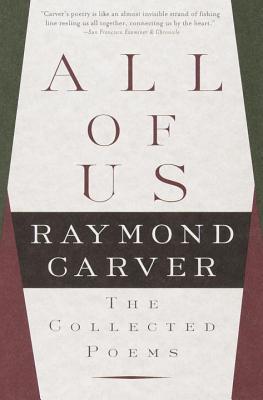 I’d raised a few eyebrows among other writers I know when I said that I didn’t find the “genius” in Raymond Carver’s short stories. Of course, they took that to mean that I didn’t like him. On the contrary: I liked his stories a lot. I just didn’t see what the “big deal” was about them. But I tried. Believe me, I tried — just about read all of them at this point. I do love his minimalist style and some of his stories were absolutely outstanding. Others...well.... after a while many of them seemed the same to me. Carver, known best for his short fiction, began his career as a poet and this collection, All Of Us, is an anthology of all his published poetry plus some (then) unpublished work.
I’d raised a few eyebrows among other writers I know when I said that I didn’t find the “genius” in Raymond Carver’s short stories. Of course, they took that to mean that I didn’t like him. On the contrary: I liked his stories a lot. I just didn’t see what the “big deal” was about them. But I tried. Believe me, I tried — just about read all of them at this point. I do love his minimalist style and some of his stories were absolutely outstanding. Others...well.... after a while many of them seemed the same to me. Carver, known best for his short fiction, began his career as a poet and this collection, All Of Us, is an anthology of all his published poetry plus some (then) unpublished work. 2
2

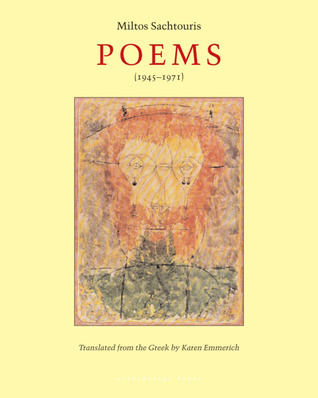 A very interesting collection of poetry from Greek surrealist Miltos Sachtouris. Admittedly a poet I had never heard of before (he is renowned in his native Greece) this was a “stumble upon” purchase and once I read the first two poems in the collection I knew I had to read the rest. Sachtouris relies heavily on surrealist imagery and there are many reoccurring images such as birds, a broken/bloody/fractured moon, severed hands/fingers, nails, blood but these are no gratuitous images; for they reflect what Sachtouris saw all around him while writing these poems: the occupation of Greece by the Nazis, civil war and the eventual military dictatorship that took hold in the late 1960s through the mid-1970s.
A very interesting collection of poetry from Greek surrealist Miltos Sachtouris. Admittedly a poet I had never heard of before (he is renowned in his native Greece) this was a “stumble upon” purchase and once I read the first two poems in the collection I knew I had to read the rest. Sachtouris relies heavily on surrealist imagery and there are many reoccurring images such as birds, a broken/bloody/fractured moon, severed hands/fingers, nails, blood but these are no gratuitous images; for they reflect what Sachtouris saw all around him while writing these poems: the occupation of Greece by the Nazis, civil war and the eventual military dictatorship that took hold in the late 1960s through the mid-1970s.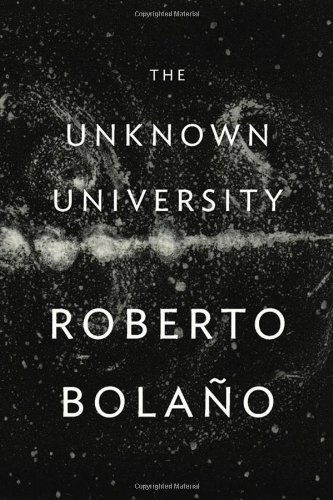 This is especially for the Bolaño completists. Chilean author Roberto Bolaño is better known for his novels and short fiction but he always considered himself a poet first and foremost (he only took up writing fiction after the birth of his son when he was 40). Since his death, a steady stream of his work has been published in translation and has placed him at the top of the literary ladder the world over.
This is especially for the Bolaño completists. Chilean author Roberto Bolaño is better known for his novels and short fiction but he always considered himself a poet first and foremost (he only took up writing fiction after the birth of his son when he was 40). Since his death, a steady stream of his work has been published in translation and has placed him at the top of the literary ladder the world over.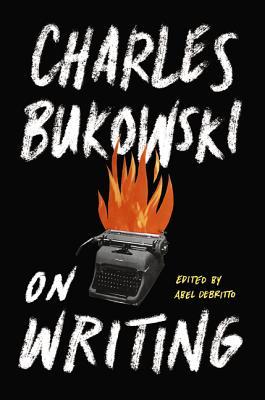 Books ‘on writing‘ are a dime a dozen, especially books on writing by famous authors and poets. I’ve read many of them over the course of time and I find a lot of them interesting. The problem with many of these books are that they only reveal that one particular author’s working methods. Perhaps they offer some insight to a writer who is just beginning, or even the seasoned veteran, or even perhaps someone who is intrigued by their favorite author’s approach, but for the most part, they tend to be very subjective.
Books ‘on writing‘ are a dime a dozen, especially books on writing by famous authors and poets. I’ve read many of them over the course of time and I find a lot of them interesting. The problem with many of these books are that they only reveal that one particular author’s working methods. Perhaps they offer some insight to a writer who is just beginning, or even the seasoned veteran, or even perhaps someone who is intrigued by their favorite author’s approach, but for the most part, they tend to be very subjective.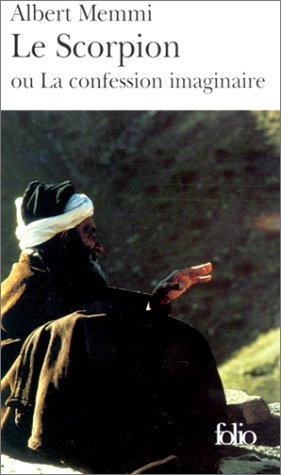 Published in 1969, The Scorpion by Tunisian author Albert Memmi is one of those novels that were common among the postmodern literature wave that was taking place at the time. Although very different, this novel sort of reminds me a little of Julio Cortazar’s Hopscotch. A highly experimental narrative, Memmi employs a highly metafictional structure here. If late 1960s postmodern experimental fiction is your thing, this is the book for you, although it’s not that easy to get a hold of in English translation these days (my copy is a very old edition I happened to stumble on in a local bookstore).
Published in 1969, The Scorpion by Tunisian author Albert Memmi is one of those novels that were common among the postmodern literature wave that was taking place at the time. Although very different, this novel sort of reminds me a little of Julio Cortazar’s Hopscotch. A highly experimental narrative, Memmi employs a highly metafictional structure here. If late 1960s postmodern experimental fiction is your thing, this is the book for you, although it’s not that easy to get a hold of in English translation these days (my copy is a very old edition I happened to stumble on in a local bookstore). No relation to the other Murakami (as far as I know). However, this Murakami — of the same generation as his contemporary — shows a distinctly American/Western influence on his writing. Whereas Haruki Murakami dips his toes into surrealism and magical realism, Ryu Murakami is pure noir, at least with this effort. In The Miso Soup is a highly dark and disturbing novel — part thriller, part noir-ish crime story.
No relation to the other Murakami (as far as I know). However, this Murakami — of the same generation as his contemporary — shows a distinctly American/Western influence on his writing. Whereas Haruki Murakami dips his toes into surrealism and magical realism, Ryu Murakami is pure noir, at least with this effort. In The Miso Soup is a highly dark and disturbing novel — part thriller, part noir-ish crime story.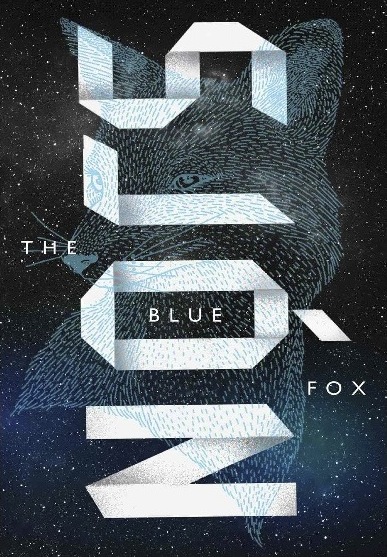 A very strange, dark and beautifully written short novel by Icelandic author Sjón. The prose is simply beautiful and takes the reader right to the time and place in which the story unfolds — over ten days in the winter of 1883. The mood of the novel reminds me a lot of the American author Jack London (and in some ways Herman Melville) but London or Melville ever got this dark. (Just for the record, as to whether or not these two authors influenced Sjón is unknown). Throw in a touch of magical realism and you have here a story that not only examines the darker side of human nature but also treads into the territory of fable and myth.
A very strange, dark and beautifully written short novel by Icelandic author Sjón. The prose is simply beautiful and takes the reader right to the time and place in which the story unfolds — over ten days in the winter of 1883. The mood of the novel reminds me a lot of the American author Jack London (and in some ways Herman Melville) but London or Melville ever got this dark. (Just for the record, as to whether or not these two authors influenced Sjón is unknown). Throw in a touch of magical realism and you have here a story that not only examines the darker side of human nature but also treads into the territory of fable and myth. A love story of psychological and emotional depth. Italian author Andrea Canobbio weaves a fascinating tale here along with an interesting narrative framework. The story is told through the point of view of a son imagining his parents past in the years leading up to him being born. Being that the three years in which the story takes place is the recent past, the reader is under the assumption that the narrator is telling the story from his own middle aged years, well into the future.
A love story of psychological and emotional depth. Italian author Andrea Canobbio weaves a fascinating tale here along with an interesting narrative framework. The story is told through the point of view of a son imagining his parents past in the years leading up to him being born. Being that the three years in which the story takes place is the recent past, the reader is under the assumption that the narrator is telling the story from his own middle aged years, well into the future.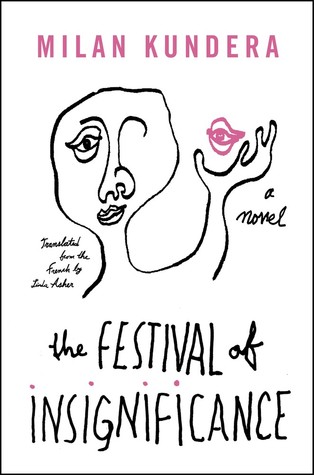 I’m having a hard time understanding why many critics had bad things to say about this novel. Kundera doesn’t break any new ground here, true; but the writing is as sharp and as witty as ever — his particular talent of bridging the gap between deadly serious and farce and satire. The title alone should clue the reader in on what they are about to read isn’t so “serious”. However, it is, in ways I think the critics of this novel have either overlooked (which isn’t likely) or they simply thought it was time to tear down a great novelist from his pedestal. (Which is more likely the case).
I’m having a hard time understanding why many critics had bad things to say about this novel. Kundera doesn’t break any new ground here, true; but the writing is as sharp and as witty as ever — his particular talent of bridging the gap between deadly serious and farce and satire. The title alone should clue the reader in on what they are about to read isn’t so “serious”. However, it is, in ways I think the critics of this novel have either overlooked (which isn’t likely) or they simply thought it was time to tear down a great novelist from his pedestal. (Which is more likely the case). Italian author Paolo Giordano’s follow up to the excellent The Solitude of Prime Numbers. It is a novel of war — both militarily as well as emotionally and psychologically — which has drawn many comparisons to Joseph Heller’s Catch 22.
Italian author Paolo Giordano’s follow up to the excellent The Solitude of Prime Numbers. It is a novel of war — both militarily as well as emotionally and psychologically — which has drawn many comparisons to Joseph Heller’s Catch 22.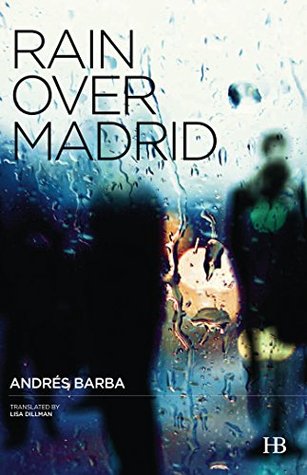 Spanish author Andres Barba’s English language debut, brought to you by the amazing folks at Hispabooks Publishing (who are bringing previously untranslated contemporary Spanish authors for the English speaking reader — something I’ve been waiting for for some time now). In his native Spain, Barba is the author of about 12 books of literary fiction, non-fiction, photography, art and children’s books. In 2010 Granta included him in their Best of Young Spanish-Language Novelists.
Spanish author Andres Barba’s English language debut, brought to you by the amazing folks at Hispabooks Publishing (who are bringing previously untranslated contemporary Spanish authors for the English speaking reader — something I’ve been waiting for for some time now). In his native Spain, Barba is the author of about 12 books of literary fiction, non-fiction, photography, art and children’s books. In 2010 Granta included him in their Best of Young Spanish-Language Novelists. Anna Gavalda’s Billie is truly a wonderful story. Basically a story about two misfits who find one another, it is Gavalda’s voice which makes this the enjoyable read that it is.
Anna Gavalda’s Billie is truly a wonderful story. Basically a story about two misfits who find one another, it is Gavalda’s voice which makes this the enjoyable read that it is. 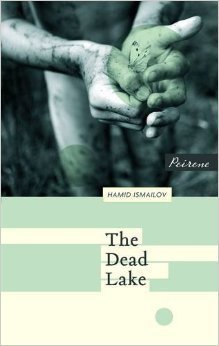 Hamid Ismailov is a Kyrgyz born author who moved to Uzbekistan at a young age. In 1994 he was forced to move to the U.K due to “unacceptable democratic tendencies”. His novel The Dead Lake, set in the Kazakhstan steppes, is a magical realist fable in the vein of Salman Rushdie and Gunter Grass.
Hamid Ismailov is a Kyrgyz born author who moved to Uzbekistan at a young age. In 1994 he was forced to move to the U.K due to “unacceptable democratic tendencies”. His novel The Dead Lake, set in the Kazakhstan steppes, is a magical realist fable in the vein of Salman Rushdie and Gunter Grass. A very short novel by Kyrgyz author Chingiz Aïtmatov. Billed as a “love story”, which it most definitely is, it isn’t quite a romance. If anything, it’s a love story about Kyrgyzstan through the eyes of an artist looking back at his childhood during World War II.
A very short novel by Kyrgyz author Chingiz Aïtmatov. Billed as a “love story”, which it most definitely is, it isn’t quite a romance. If anything, it’s a love story about Kyrgyzstan through the eyes of an artist looking back at his childhood during World War II.  Once, I got lost. I was six or seven. I got distracted, and all of a sudden I couldn’t see my parents anymore. I was scared, but I immediately found the way home and got there before they did. They kept looking for me, desperate, but I thought that they were lost. That I knew how to get home and they didn’t. “You went a different way,” my mother said later, angry, her eyes still swollen. You were the ones that went a different way, I thought, but I didn’t say it.
Once, I got lost. I was six or seven. I got distracted, and all of a sudden I couldn’t see my parents anymore. I was scared, but I immediately found the way home and got there before they did. They kept looking for me, desperate, but I thought that they were lost. That I knew how to get home and they didn’t. “You went a different way,” my mother said later, angry, her eyes still swollen. You were the ones that went a different way, I thought, but I didn’t say it.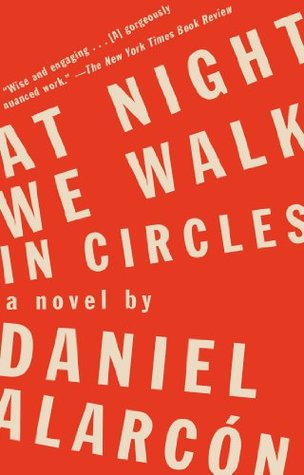 Peruvian-American author Daniel Alarcón has written a very interesting work here. It combines the best of the canon of Latin American fiction - with it’s toying with and blurring the lines between reality and fable - and a first rate mystery. What intrigues me most about the novel more than anything else is its narrative approach.
Peruvian-American author Daniel Alarcón has written a very interesting work here. It combines the best of the canon of Latin American fiction - with it’s toying with and blurring the lines between reality and fable - and a first rate mystery. What intrigues me most about the novel more than anything else is its narrative approach. 

